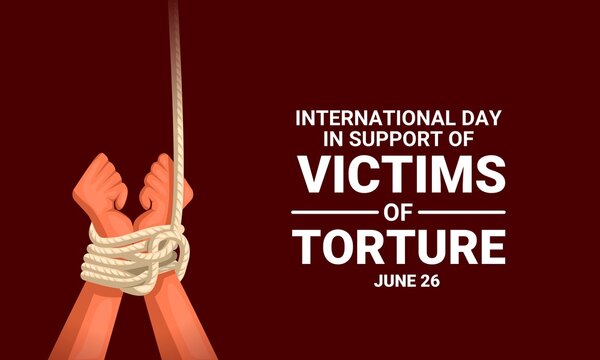ASTANA – As the world marked the International Day in Support of Victims of Torture on June 26, Kazakhstan reaffirmed its commitment to international obligations aimed at eliminating torture. The implementation of the provisions of the Convention Against Torture, which the country ratified in 1998, remains a fundamentally important guideline for the development of Kazakhstan, according to a June 26 statement of the country’s Prosecutor General’s Office.

Photo credit: Adobe Stock.
In 1997, the United Nations General Assembly declared June 26 the International Day in Support of Victims of Torture, with a view to fully eradicate torture and effectively implement the Convention Against Torture and Other Cruel, Inhuman or Degrading Treatment or Punishment.
Kazakhstan has ratified fundamental human rights conventions, including the International Covenant on Civil and Political Rights, the Convention on the Rights of the Child, the Convention on the Elimination of All Forms of Discrimination against Women, the Convention on International Access to Justice, and the Convention on the Rights of Persons with Disabilities.
“In the program Just Kazakhstan – for All and for Everyone, Now and Forever [President Tokayev’s electoral program], the President of Kazakhstan, Kassym-Jomart Tokayev, emphasized the protection of citizens’ rights. He focused on taking measures to prevent torture and other illegal methods of investigation that degrade human dignity and harm the well-being of citizens,” said the Prosecutor General’s Office.
Torture-related cases involving 35 law enforcement personnel have been sent to court. Seventeen individuals have been convicted, according to the Prosecutor General’s Office.
To implement the task set by the President to strengthen protection against torture and ill-treatment, a set of measures was adopted in criminal law to ensure zero tolerance for torture.
President Tokayev signed the law in March, outlining harsher punishments for torture and ill-treatment and securing stronger protection for human rights and freedom.
Other significant milestones include the exclusive jurisdiction of the Prosecutor’s Office in cases of torture since Jan. 1, 2023, the abolition of the death penalty at the constitutional level, amendment to Article 146 of the Criminal Code to outline liability for cruel, inhuman and degrading treatment, and expansion of the list of subjects undertaking torture and ill-treatment to include “a person in an official role.”
“At present, persons convicted of torture cannot be placed on probation. These persons are not subject to amnesty and statutes of limitations. Their reconciliation with the victim also does not exempt them from criminal liability,” said the Prosecutor’s Office.
The constitutional amendments in 2022 also defined the constitutional status of the Ombudsperson for Human Rights, whose work is aimed at protecting human and civil rights and freedoms, and to whom every citizen can appeal in case of violation of his rights and freedoms. Local offices of the ombudsperson are operating across the country.
According to the Prosecutor’s Office, crisis centers are working nationwide to ensure that victims of torture have the right to legal assistance and access to social, medical and psychological services.
The National Preventive Mechanism (NPM) against torture was established in Kazakhstan in 2013, in line with international obligations. The mechanism enables a partnership between the human rights ombudsperson and civil society representatives to prevent torture and ill-treatment.
Since its establishment, the NPM participants have conducted over 5,000 visits to detention-related institutions and other relevant organizations and given more than 10,000 recommendations to eliminate identified violations. In the first five months of this year, the ombudsperson reviewed more than 300 complaints about illegal actions against persons in correctional and medical-social institutions. Pre-trial investigations are ongoing.
To implement the task set by Tokayev to ensure continuous video surveillance in law enforcement organizations and penitentiary institutions, 6,159 blind spots and 937 defective video surveillance cameras were identified.
According to the Human Rights Ombudsperson’s Office, continuous video surveillance in detention centers is in place, with 20,000 cameras installed. In addition, 365 terminals for the electronic submission of appeals by convicts are in operation.
“The order of the Minister of Internal Affairs establishes the personal responsibility of heads [of state bodies and agencies] for the unjustified arrest and detention of citizens, as well as for tolerating torture and other cruel, inhuman or degrading treatment,” reads the statement.
To fulfill its obligations under international human rights treaties, Kazakhstan’s legislation defines a clear procedure for engaging with treaty bodies, UN special procedures and consideration of their requests.
On May 2-3, Kazakhstan’s delegation headed by Igor Rogov, Chairman of the Commission on Human Rights under the Administration of the President of Kazakhstan, and Bulat Dembayev, Deputy Prosecutor General, took part in the 76th session of the UN Committee against Torture in Geneva, where they presented the country’s Fourth Periodic Report on the implementation of the convention against torture.
The first such report was considered by the committee in 2001, with the latest one in 2014.
“In 2001, I was here taking part in the first report of Kazakhstan on torture. I was the Minister of Justice at the time. In our country, we consider the Committee against Torture and the recommendations it issues to be of significant assistance from the methodological and organizational perspective, as it helps us to implement the provisions enshrined in our Constitution. The highest value of our country is people and their well-being, and we want this to be reflected in practice,” said Rogov.
The committee is expected to publish its concluding assessment on Kazakhstan, which the state bodies will use to prepare the follow-up report. In line with the procedures, in addition to the state’s report, international and national nongovernmental organizations also send alternative reports to the UN committee with their assessments.
Rogov said Kazakhstan is moving in the right direction, and the election of Kazakhstan as a member of the UN Human Rights Council for 2022-2024 during the 76th session of the UN General Assembly confirmed the role of Kazakhstan as an active and responsible participant in the process of promoting international norms in the field of human rights and freedoms protection.
